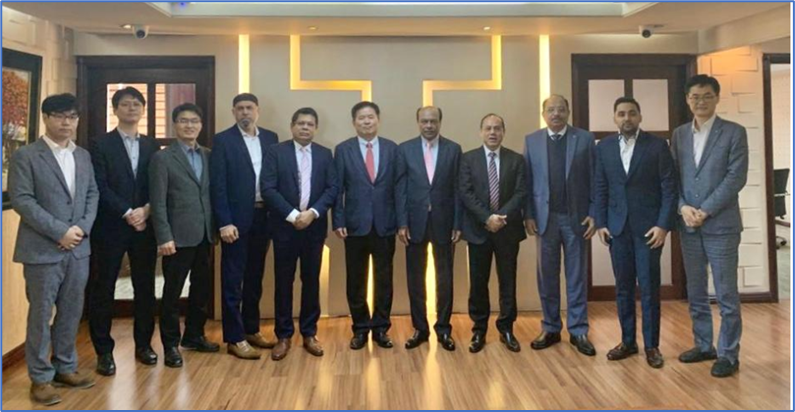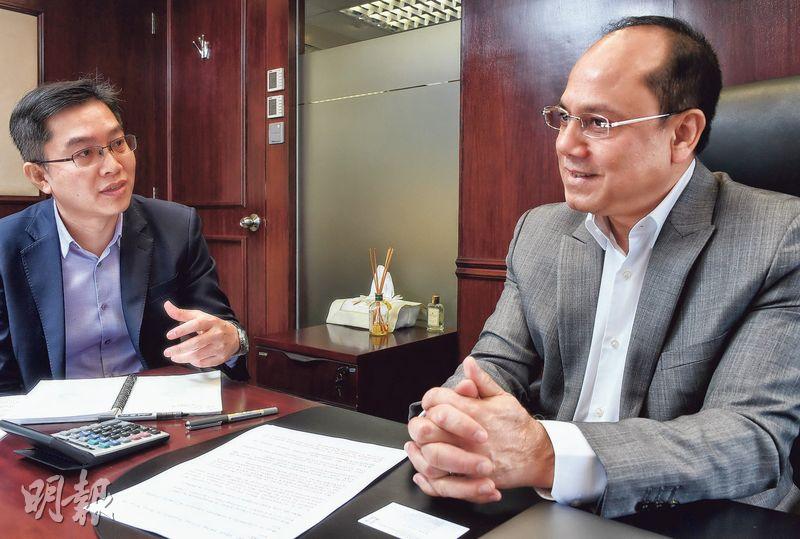Success down under for our team in Cemcoa selling Slag to a new customer and securing the sale of White Clinker in Australia. As well as establishing new relationships and first time Clinker Sales in NZ.
October, 2020.
Success down under for our team in Cemcoa selling Slag to a new customer and securing the sale of White Clinker in Australia. As well as establishing new relationships and first time Clinker Sales in NZ.
October, 2020.
Cemcoa’s Energy Team has strategically positioned the company as a market leader for coal imports in Bangladesh. The current market dynamics consists of 12 active importers and 4 active customers.
September, 2020.
Exciting times for the Hong Kong and the Bangladesh team, Cemcoa will be supplying over 1 million tons of raw material for the Hazrat Shahjalal International Airport Expansion Project.
August, 2020.


【明報專訊】中美貿易戰愈演愈烈,再次令人想到分散投資。迪拜因為優越的地理位置,貿易和交通網絡發達,兼且稅制吸引,又獲得2020年世界博覽會主辦權,再度成為政府及商界呼籲拓展的新興市場。有孟加拉公司比港商更具眼光,早已看中當地龐大的基建需求,以及新法規要求,正在當地投資設廠,準備生產「綠色水泥」,預料明年底投產。
順承集團(Shun Shing Group)共同創辦人兼董事總經理Ikram Ahmed Khan表示,公司是與他兩名兄長於1988年在孟加拉成立,最初是一間從事水泥等商品貿易的家庭式公司,1990年來香港設立控股公司。由2001年起,集團先後在孟加拉開設了兩間水泥廠,並成立航運公司。
Ikram Ahmed Khan表示,在8年前,集團已曾在迪拜購入一幅工業用地,準備在當地設廠生產綠色水泥;因迪拜經濟其後轉差,所以暫時押後投資計劃,將地皮轉讓給其他公司。直至3年前,決定重新推行在迪拜設廠生產綠色水泥的計劃。
他解釋,因為近年迪拜經濟好轉之外,當地在2015年通過新法例,強制新建築物必須使用綠色水泥。所謂綠色水泥(Green Cement),其實是一半由水泥、一半由礦渣(Slag,煉鋼廠的副產品)壓搾加工混合而成。綠色水泥除了可以將礦渣消耗掉,減少廢物以及生產過程中的碳排放,以及售價略低及長遠的強度較普通水泥為佳。
Ikram Ahmed Khan表示,歐洲有研究顯示,使用普通水泥建造的建築物經過大約20年之後,其強度就會緩慢下降;但使用綠色水泥建造的建築物,其強度這時卻反而會緩慢地上升。
重推迪拜設廠計劃 投資近4億
此外,阿聯酋的最大酋長國阿布扎比以及第三大酋長國沙迦(Sharjah),分別在2016年及2018年通過同樣的新法例。科威特、阿曼及沙特阿拉伯雖然沒有強制新建築物必須使用綠色水泥,但亦已接受建造業使用綠色水泥。因此,整體環境都對公司設廠生產綠色水泥的計劃有利。
順承集團財務總經理邱鯨安表示,集團在迪拜一個工業園租到一塊面積465,122方呎的地皮,將其中大約一半面積用來興建稱為Dubai one的綠色水泥廠,投資5000萬美元(約3.9億港元)。地皮位於迪拜近年新發展的南部,接近2020年舉行世界博覽會會場,預料將對綠色水泥有龐大需求。
從中國日本印度購原材料
該廠由中國重型機械有限公司及中國中材國際工程股份有限公司承建,機械設備向德國公司Loesche購入,融資由匯豐銀行協助。工廠日後的管理層從中國內地輸入,工人由中國內地、孟加拉及印度3個國家引入。至於使用的礦渣會從中國內地、日本及印度的煉鋼廠購入。預料到了明年11月或12月,廠房開始投產,產品主要供應給阿聯酋國內使用,估計生產的綠色水泥將比迪拜現時生產的普通水泥廉宜約10%;到2020年,廠房每年產能將可以達到約100萬噸。
這次是順承集團首次在孟加拉以外投資設廠,投資計劃較保守,與同系孟加拉水泥廠的總產能(2020年達750萬噸)相比,仍有一段距離。不過,集團在迪拜租用的工業用地已預留了一半的面積,可供將來的新業務使用。
一般企業只繳增值稅
除政經穩定之外,稅制亦是吸引順承在迪拜設廠,因為阿聯酋只有能源企業和銀行需要繳交利得稅,一般企業只需就每宗交易支付5%的增值稅。不過,阿拉伯國家對於外商投資普遍設有不能獨資的限制,大多數規定投資項目必須由當地人或當地企業出任法人代表(Local Sponsor),至少持有51%的股份,外商最多只可持有49%的股份,阿聯酋亦不例外。這是很多外國投資者最憂慮的問題,會否成為日後雙方爭拗的隱憂?
對此,Ikram Ahmed Khan坦承,在迪拜設廠是百分百由集團出資,擔任法人代表的當地企業並無出資。他表示,由當地人或企業出任法人代表的制度已有很長歷史,可以視為一種變相的稅項。以他們所知,大部分當地的法人代表都只是每年收取一筆固定的收入,並非按名義股權分享盈利或控制有關企業。迪拜有很多中介公司,專門協助外商處理有關當地法人代表的問題。
須當地法人代表 外資限49%持股
他建議,由一家當地企業出任法人代表,會比由一名當地人出任法人代表較穩陣,尤其是對大型投資項目來說。因為若是由一名當地人出任法人代表,當對方逝世後,其法人代表的地位便會自動由其兒子繼承,後者屆時有可能會「坐地起價」,要求提高所收取的年費。
相反,若是由專業的中介公司安排,以一家當地企業出任法人代表,即使企業董事逝世,中介公司可以找另一名當地人出任董事,令外商的投資項目可以保持。
明報記者 薛偉傑
[企業創富]
詳細請參閱以下連結﹕
https://news.mingpao.com/pns/dailynews/web_tc/article/20180928/s00004/1538072484513

[Ming Pao News Reports] Dubai, to host the World Expo in 2020, sets new legislation to improve environmental protection requirements. The Sino-US trade war has intensified, and once again it is thought to diversify investment. Due to its superior geographical location, developed trade and transportation network, and the attraction of the tax system, Dubai has also won the right to host the 2020 World Expo and has once again become an emerging market that the government and the business community have called for expansion. Some Bangladeshi companies have more insights than Hong Kong companies. They have already taken advantage of the huge local infrastructure needs and new regulatory requirements. They are investing in local factories to prepare for the production of “green cement”, which is expected to be put into operation by the end of next year.
Ikram Ahmed Khan, Co-founder and Managing Director of Shun Shing Group, said that the company was founded in Bangladesh in 1988 with his two brothers. It was originally a family-owned company engaged in the trade of cement and other commodities. In 1990 they established a holding company in Hong Kong. Since 2001, the group has opened two cement plants in Bangladesh and established a shipping company.
Eight years ago, the group had purchased an industrial land in Dubai and was preparing to set up a factory to produce green cement. As the Dubai economy turned around, it temporarily postponed the investment plan and transferred the land to other companies. Until three years ago, it was decided to re-implement the plan to set up a factory to produce green cement in Dubai, said Ikram Ahmed Khan.
He explained that in recent years, the Dubai economy has improved, and the local government passed new legislation in 2015, forcing new buildings to use green cement. The so-called green cement is actually half of cement and half of slag (a by-product of steel mills). In addition to the consumption of slag, green cement reduces waste and carbon emissions during production, as well as slightly lower prices and longer-term strength than ordinary cement.
Studies in Europe have shown that buildings built with ordinary cement will slowly decrease in strength after about 20 years; however, the strength of buildings constructed with green cement will slowly rise, said Ikram Ahmed Khan.
Re-launch Dubai’s plan to invest nearly 400 million
In addition, Abu Dhabi, the largest emirate in the UAE, and Sharjah, the third largest emirate, passed the same new legislation in 2016 and 2018, respectively. Although Kuwait, Oman and Saudi Arabia have not mandated the use of green cement for new buildings, they have also accepted the use of green cement in the construction industry. Therefore, the overall environment is beneficial to the company’s plan to set up factories to produce green cement.
John Khew, General Manager Finance of Shun Shing Group, said that the group rented a land of 465,122 square meters in an industrial park in Dubai, and about half of it was used to build a green cement plant called Dubai one, with an investment of 50 million US dollars (HK$390 million). The site is located in the newly developed southern part of Dubai in recent years. Near the 2020 World Expo venue, it is expected that there will be huge demand for green cement.
Purchase raw materials from China, Japan, India
The plant was built by China Heavy Machinery Co., Ltd. and China Sinoma International Engineering Co., Ltd., and the machinery and equipment were purchased from the German company Loesche. The financing was assisted by HSBC. The management of the factory was imported from mainland China in the future, and workers were introduced from three countries: Mainland China, Bangladesh and India. As for the slag used, it will be purchased from steel mills in mainland China, Japan and India. It is expected that in November or December next year, the plant will start production and the products will be mainly supplied to the UAE for domestic use. It is estimated that the green cement produced will be about 10% cheaper than the ordinary cement currently produced in Dubai. By 2020, the annual production capacity of the plant will be reached, about 1 million tons.
This time, Shun Shing Group invested in a factory outside of Bangladesh for the first time. The investment plan is relatively conservative, and there is still a long way to go compared with the total capacity of the same Bangladesh cement plant (7.5 million tons in 2020). However, the Group has reserved half of the industrial land leased in Dubai for future new business use.
Only VAT applied to general companies
In addition to political stability, the tax system is also attractive to set up factories in Dubai, because only the energy companies and banks in the UAE need to pay profits tax, the average company only needs to pay 5% VAT on each transaction. However, the Arab countries generally have restrictions on foreign investment that cannot be sole proprietorship. Most of the required investment projects must be local sponsors by local people or local enterprises, and at least 51% of the shares must be held. Foreign investors can only hold at most 49. % of the shares, the UAE is no exception. This is the most worrying issue for many foreign investors. Will it become a worry for the dispute between the two sides in the future?
In this regard, Ikram Ahmed Khan admits that the establishment of a factory in Dubai is 100% funded by the group, and the local companies acting as legal representatives do not contribute. He said that the system of legal representatives represented by local people or enterprises has a long history and can be regarded as a disguised tax. As far as they know, most local legal representatives only collect a fixed income each year, not sharing profits or controlling the relevant companies according to the nominal equity. There are a number of intermediaries in Dubai that specialize in assisting foreign companies in dealing with local legal representative issues.
Local legal representative is required. Foreign investment is limited to 49%.
He suggested that a legal representative from a local company would be more reliable than a local representative, especially for large investment projects. Because if a local person is appointed as a legal representative, in case the other party dies, the status of the legal representative will be automatically inherited by his son. It may demand an increase in the annual fee charged.
The other way round, if it is arranged by a professional intermediary company and a local company is appointed as a legal representative, even if the company director dies, the intermediary company can find another local person to serve as a director, so that the foreign investment project can be maintained.
See full interview here:
https://news.mingpao.com/pns/dailynews/web_tc/article/20180928/s00004/1538072484513